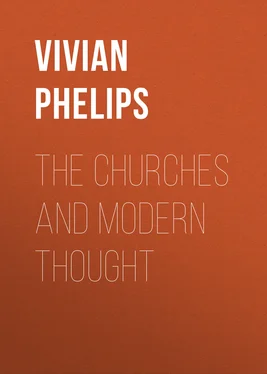Vivian Phelips - The Churches and Modern Thought
Здесь есть возможность читать онлайн «Vivian Phelips - The Churches and Modern Thought» — ознакомительный отрывок электронной книги совершенно бесплатно, а после прочтения отрывка купить полную версию. В некоторых случаях можно слушать аудио, скачать через торрент в формате fb2 и присутствует краткое содержание. Жанр: foreign_prose, foreign_religion, Философия, foreign_antique, на английском языке. Описание произведения, (предисловие) а так же отзывы посетителей доступны на портале библиотеки ЛибКат.
- Название:The Churches and Modern Thought
- Автор:
- Жанр:
- Год:неизвестен
- ISBN:нет данных
- Рейтинг книги:4 / 5. Голосов: 1
-
Избранное:Добавить в избранное
- Отзывы:
-
Ваша оценка:
- 80
- 1
- 2
- 3
- 4
- 5
The Churches and Modern Thought: краткое содержание, описание и аннотация
Предлагаем к чтению аннотацию, описание, краткое содержание или предисловие (зависит от того, что написал сам автор книги «The Churches and Modern Thought»). Если вы не нашли необходимую информацию о книге — напишите в комментариях, мы постараемся отыскать её.
The Churches and Modern Thought — читать онлайн ознакомительный отрывок
Ниже представлен текст книги, разбитый по страницам. Система сохранения места последней прочитанной страницы, позволяет с удобством читать онлайн бесплатно книгу «The Churches and Modern Thought», без необходимости каждый раз заново искать на чём Вы остановились. Поставьте закладку, и сможете в любой момент перейти на страницу, на которой закончили чтение.
Интервал:
Закладка:
§ 3. Christianity and Science not Reconciled
Has the Church, then, been deceived in her impression that a reconciliation has taken place between Christianity and Science? Most certainly. I grant that to some extent there exists a patched-up peace. The modern apologist no longer adopts the unwise course of maintaining every strange phenomenon to be miraculous as long as it is unexplained, whereby each advance of physical science used necessarily to be hostile to theology. He even goes further, and says that the Resurrection and all the miracles may be only the manifestation of some law which is as yet beyond the analysis of our short experience. But, as I shall show later on, the new interpretations tone down hostility in one respect only to raise fresh and greater difficulties in another.
The manner in which misunderstandings occur on the subject of a reconciliation is well seen when we look into one of the Church’s most popular arguments in its favour—the appeal to the pronouncement by Lord Kelvin in support of a Creative Power. Lord Kelvin assured the world that modern biologists were “coming to the belief in the existence of a vital principle.” 12 12 As a matter of fact, no distinguished leader among modern biologists has come to any such conclusion. People are apt to forget that, while Lord Kelvin is undoubtedly one of the most distinguished living physicists, he is not himself a biologist.
That this pronouncement raised a perfect storm of protest in the world of science is wholly ignored by the world of religion. Suppose, however, that the consensus of opinion had been otherwise, what conclusion could we draw? We simply obtain an argument for some form of Theism. The probability of the existence of a Creative Power would not in itself prove the truth of the Christian dogmas, although it would be a very necessary link in the chain of evidence. It is extremely doubtful whether any scientist or philosopher really holds the doctrine of a personal God, certainly not of the anthropomorphic God of Christianity. Let us take Sir Oliver Lodge, for example. He is continually being held up to us by the Church as an instance of a man of science who finds himself able to believe in the supernatural; but does the Church claim him as one of her fold? In the Hibbert Journal for April, 1904, he makes out a strong case for the entire re-interpretation of the Christian doctrine, in which, among other dogmas, the Atonement and Virgin-birth are completely surrendered. He has never yet professed belief in a personal God, and seems to question His omnipotence. 13 13 See Nature , April 23rd, 1903; also Appendix to this work.
Again, in a paper which he contributed lately to a book of essays entitled Ideals of Science , he owns that science is a long way from actively supporting religion. In spite of this, no name is, or used to be, more frequently quoted than his, in support of the Church’s contention that a reconciliation has taken place.
The admissions of Sir Oliver Lodge are, in a certain sense, all the more important because he undoubtedly is one of the few men of science who still retain a strong belief in a spiritual world. In the Hibbert Journal for January, 1905, he informs us that he is opposed to a materialistic monism, such as Haeckel’s, and that “the progress of thought has left him [Haeckel], as well as his great English exemplar, Herbert Spencer, somewhat high and dry, belated and stranded by the tide of opinion which has now begun to flow in another direction.” 14 14 This assertion is severely criticised by Mr. Joseph McCabe in the Hibbert for July, 1905. Mr. McCabe holds that “Sir Oliver Lodge’s own conception of life may, with a far greater show of reason, be described as a modified survival of an older doctrine” (p. 746).
This is the sort of statement which is eagerly seized upon by the Church; but it neither witnesses to the truth of Christianity, nor does it voice the opinion of the scientific world. It is the opinion of a scientist who believes that he has had “communication with spirits.” 15 15 Dr. Alfred Russel Wallace, the distinguished naturalist and evolutionist, is another scientist with spiritist convictions, and his concern for supernatural religion led him to step outside his own domain and make that remarkable attack upon current scientific opinions in astronomical matters which met with such unanimous condemnation (see the Fortnightly Review for March and September, 1903).
Professor Ray Lankester, one of our leading biologists in England, indignantly refutes Sir Oliver’s strictures on Professor Haeckel. 16 16 In the Times , October, 1904.
Now, it is, of course, quite true that there are schools of thought opposed to Haeckel’s. There is, for instance, the school which considers that science has no business to concern herself with theology; and there are the metaphysicians. But the point I wish to make clear is that all these schools are heterodox. They do not accept the Christian dogmas. It is so easy for false impressions on such matters to get about, and, I regret to add, this does not occur altogether by chance. When Haeckel, one of our greatest living biologists, was caught tripping in his knowledge of theology by a professor of that subject, the Church explained to the laity that the great Dr. Loofs had shown that Haeckel had forfeited his claim to consideration as a reliable man of science; and, on this basis, his Riddle of the Universe was held up to obloquy and derision. The Church, however, did not mention at the same time that Haeckel had expressly said that he was not skilled in theology, and that it was only in his own branch of knowledge that he spoke with authority. Nor did the Church mention that their champion, the learned theologian, Dr. Loofs, himself discredits the notion of the Virgin-birth, and that the chief bone of contention between the two professors was simply the question of the parentage of Jesus.
It is just because science and religion are in conflict that the religious naturally wish to discredit science. They will, if they are sufficiently ignorant, go so far as Lady Blount, 17 17 At Exeter Hall, in March, 1905, Lady Blount developed her “flat-earth” theory, and accused Newton of want of logic.
and hold that the earth is flat and without motion. But such persons should note that in the Church itself there are a few—the few best qualified to form an opinion—who accept all the main facts of science, and do not think, or pretend that they think, that there has been any reconciliation. The Rev. P. N. Waggett is one of these. He is an apologist of unusual scientific competence, and his new handbook for the clergy, Religion and Science , simply bristles with problems which he confesses have yet to be solved. However, he does not allow himself to be disturbed. Conclusions adverse to theology are to be resisted. In other words, we must possess our souls in patience until we can see a way out of our difficulties. He remarks: “There are conclusions which are to be dissolved, and conclusions which are to be avoided; but there are also conclusions which have to be resisted, held at bay—‘held up,’ I think some adventurous Western people call it—until we can see our way to destroy them. Such a resistance is not irrational.” He personally prefers “the positive or scientific treatment and pursuit of religion,” and he goes on to say that “this positive pursuit of the facts of the spirit must be maintained in spite of difficulties. It must be maintained in spite of outstanding discrepancies with science.” To my mind, the position here taken up by Mr. Waggett is the only possible one for a convinced Christian who has a real knowledge of science. He avoids the snares into which so many of his fellow clerics have fallen. For he does not jump at the conclusion that every “gap” in our knowledge of life’s mysteries is a proof of the supernatural. Nor does he attempt to show, as many other apologists are wont to do, that there is no direct connection between science and religion. He does not try to escape the criticism of metaphysical conclusions which a scientific habit of thought engenders. But, while his position may appear at first sight a tenable one, whether it be so or not depends entirely upon the correctness of the assumption on which his argument is really based—the true witness of the heart, as against the false witness of the reason. It is interesting to compare Mr. Waggett’s position with that of another of the progressives. The Rev. John Kelman writes in Ideals of Science and Faith 18 18 A book, edited by the Rev. J. E. Hand (George Allen), which gives, perhaps, the best that can be said by able and fair-minded men, writing in the light of the latest knowledge and criticism, in favour of a reconciliation between religion and science. The book contains essays by various authors—Sir O. Lodge, Professors Thomson, Geddes, and Muirhead, the Rev. P. N. Waggett, the Rev. John Kelman, and others.
: “So far as we have gone, the history of the past, viewed by the light in which the newer conceptions of the Bible have placed it, shows that, at the present moment in the progress of thought, science and religion are not in the least degree at strife. They need no reconciliation.” Suppose the Rev. J. Kelman to be right and the Rev. P. N. Waggett to be wrong, what then? It is the newer conceptions of the Bible which make it possible for Mr. Kelman to speak of a reconciliation—the very conceptions which the orthodox cannot and will not accept. The orthodox believer is told that religion and science are reconciled; but he is not told by what means. Thus the orthodox, who would never think of accepting the “terribly heterodox” ideas of the advanced school, are all the time accepting a result which could only be arrived at by the help of those self-same ideas. In fact, it was the very necessity for a reconciliation which originated their invention.
Интервал:
Закладка:
Похожие книги на «The Churches and Modern Thought»
Представляем Вашему вниманию похожие книги на «The Churches and Modern Thought» списком для выбора. Мы отобрали схожую по названию и смыслу литературу в надежде предоставить читателям больше вариантов отыскать новые, интересные, ещё непрочитанные произведения.
Обсуждение, отзывы о книге «The Churches and Modern Thought» и просто собственные мнения читателей. Оставьте ваши комментарии, напишите, что Вы думаете о произведении, его смысле или главных героях. Укажите что конкретно понравилось, а что нет, и почему Вы так считаете.












